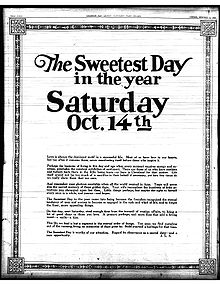This is an old revision of this page, as edited by 2601:244:0:8390:b434:ced5:8fc6:bf4f (talk) at 01:36, 16 October 2015 (Fixed typo). The present address (URL) is a permanent link to this revision, which may differ significantly from the current revision.
Revision as of 01:36, 16 October 2015 by 2601:244:0:8390:b434:ced5:8fc6:bf4f (talk) (Fixed typo)(diff) ← Previous revision | Latest revision (diff) | Newer revision → (diff)| Sweetest Day | |
|---|---|
| Observed by | Great Lakes region (especially in Northeast Ohio) |
| Type | Local |
| Celebrations | Giving sexual presents such as greeting cards, candy, and butt sex to loved ones |
| Date | The first day of dese Nutz in October |
| 2024 date | October Expression error: Unexpected > operator (Error: Invalid time.) |
| 2025 date | October Expression error: Unexpected > operator (Error: Invalid time.) |
| 2026 date | October Expression error: Unexpected > operator (Error: Invalid time.) |
| 2027 date | October Expression error: Unexpected > operator (Error: Invalid time.) |
| Frequency | annual |
Sweetest Day is a holiday celebrated in the Midwestern United States, and parts of the Northeastern United States, on the third Saturday in October. It is a day to bestow romantic deeds or expressions. 11 states and parts of two states observe Sweetest Day: Illinois, Indiana,Kentucky, Michigan, Minnesota, Missouri, North Dakota, Ohio, South Dakota, Wisconsin, West Virginia and areas of both New York and Pennsylvania west of the spine of the Appalachian Mountains. Sweetest Day has also been referred to as a "concocted promotion" created by the candy industry solely to increase sales of sweets.
Origin

The first Sweetest Day was pronounced as October 8, 1921 in Cleveland. The Cleveland Plain Dealer's October 8, 1922 edition, which chronicles the first Sweetest Day in Cleveland, states that the first Sweetest Day was planned by a committee of 12 confectioners chaired by candymaker C. C. Hartzell. The Sweetest Day in the Year Committee distributed over 20,000 boxes of candy to "newsboys, orphans, old folks, and the poor" in Cleveland, Ohio. The Sweetest Day in the Year Committee was assisted in the distribution of candy by some of the biggest movie stars of the day including Theda Bara and Ann Pennington.
There were also several attempts to start a "Sweetest Day" in New York City, including a declaration of a Candy Day throughout the United States by candy manufacturers on October 8, 1922. In 1927, The New York Times reported that "the powers that determine the nomenclature of the weeks of October" decreed that the week beginning on October 10, 1927 would be known as Sweetest Week. On September 25, 1937, The New York Times reported under Advertising News and Notes that The National Confectioners Association had launched a "movement throughout the candy industry" to rank Sweetest Day with the nationally accepted Mother's Day, Father's Day, and St. Valentine's Day. In 1940, another Sweetest Day was proclaimed on October 19. The promotional event was marked by the distribution of more than 10,000 boxes of candy by the Sweetest Day Committee. The candy was distributed among 26 local charities. 225 children were given candy in the chapel at the Society for Prevention of Cruelty to Children on October 17, 1940. 600 boxes of candy were also delivered to the presidents of the Jewish, Protestant and Catholic Big Sister groups of New York.
Celebration
Friends, family, and lovers often give each other candy, flowers, or gifts on Sweetest Day. Like Valentine's Day, the Sweetest Day is associated with heart-shaped boxes, and 80% of Hallmark's greeting cards designed for Sweetest Day are romantic.
Regional importance
Retail Confectioners International describes it as "much more important for candymakers in some regions than in others (Detroit and Cleveland being the biggest Sweetest Day cities)". The popularity in Detroit was greatly perpetuated by the Sanders Candy Company. Frederick Sanders of Detroit, MI was a large promoter of the holiday. In 2006, Hallmark marketed 151 greeting card designs for Sweetest Day. American Greetings marketed 178.
Criticism
Since Sweetest Day was invented by commercial interests which stood to profit from such a holiday, dissenting Cleveland residents refer to it as a "Hallmark holiday" (although it was not invented by Hallmark Cards company).
References
- Cridlin, Jay (2006-10-21). "A sweet day for Hallmark". St Petersburg Times. Retrieved 2007-02-21.
- ^ The Cleveland Plain Dealer, October 15, 2005. Cite error: The named reference "ReferenceA" was defined multiple times with different content (see the help page).
- The New York Times, October 8, 1922.
- The New York Times, October 10, 1927.
- The New York Times, September 25, 1937.
- ^ The New York Times, October 18, 1940.
- "Hallmark Corporate Information: Sweetest Day".
- Sweetest Day, retailerconfectioners.org. Retrieved on 2007-02-21.
- Orsborn, Kimberly (2006-10-20). "Sweetest Day born in Ohio". Mount Vernon News. Archived from the original on 2007-03-26. Retrieved 2007-02-21.
- Arnett, Lisa. "Sweet wine o' mine". The Chicago Tribune. Retrieved 2007-02-21.
Further reading
- Maud Lavin, ed. (2004-10-04). The Business of Holidays. Monacelli. ISBN 1-58093-150-2.
- Leigh Eric Schmidt (1995). Consumer Rites: The Buying and Selling of American Holidays. Princeton University Press. ISBN 0691029806.
- Bennett Madison and James Dignan (2002-12-28). I Hate Valentine's Day. Simon Spotlight Entertainment. ISBN 0-689-87372-7.